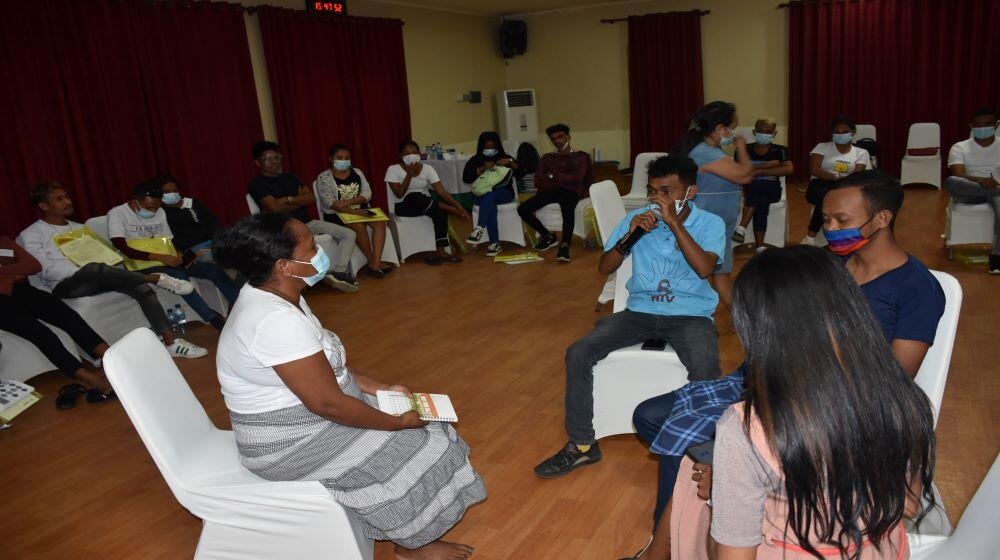DILI, October 29, 2021 – While Timor-Leste recently lifted the state of emergency following a reduction of active COVID-19 cases, raising awareness on sexually transmitted infections (STIs) and HIV among key populations in the country still faces challenges.
Leopoldina Belissima Betul*, who is a sex worker, has experienced physical abuse from some clients. She also does not feel comfortable when accessing health services in public health facilities and is hesitant to share her experiences with her boyfriend.
“My main fear is that sometimes I encounter physical abuse from clients. I have also been called names by members of the public when I seek services in public health centers,” says Leopoldina*.
According to UNAIDS, the five main key population groups that are particularly vulnerable to HIV and frequently lack adequate access to services include; gay men and other men who have sex with men, sex workers, transgender people, people who inject drugs and prisoners and other incarcerated people.
A recent report from the Global Fund to Fight AIDS, Tuberculosis and Malaria (Global Fund) shows that globally testing for HIV and prevention services have relaxed as governments put more emphasis on COVID-19 while diverting resources that would have been used to fight other ailments. Similarly, the number of people accessing HIV treatment declined by 11 per cent in 2020 while those going for tests went down by 22 per cent.
However, in Timor-Leste an effective key population (KP) network has supported uninterrupted services during emergencies.
According to Mr. Bernardino da Cruz, manager of the National HIV/AIDS programme in Timor-Leste, access to key services for key population was maintained due to great coordination from their network and health clinics tailored to meet their needs.
“We have witnessed significant increase in the number of key population groups accessing HIV services. This can be credited mostly to uninterrupted outreach services to key populations during COVID-19 and floods disaster that affected Timor-Leste in early 2021, and supply of a prevention service package by UNFPA,” says Mr. Bernardino.
Arnaldo dos Santos Terceiro* agrees that the KP community is very close and supports each other through peer to peer sessions.
“I have found great support as a gay person from KP community. I feel free to share with others like me about my experiences,” Arnaldo shares.
As the sub-recipient of the Ministry of Health for the Global Fund grant, UNFPA manages and implements a comprehensive HIV Prevention Programme for KP groups in Timor-Leste in collaboration with Associação Comunidade Progresso, a local KP-led non-governmental organization.
The programme includes HIV prevention sessions and behavior change interventions, condom and lubricant distribution, and is currently being implemented in the municipalities of Baucau, Dili, Covalima, Bobonaro and the Special Administrative Region of Oecusse-Ambeno, with Drop-in-Centers (DIC) established to facilitate counselling, testing and referral for HIV and STI treatment, family planning, legal and psychosocial services. services to key populations.
Constantina Jacinta*, a 22-year-old sex worker, is confident with the reproductive health services received through the KP network.
“Before I used to have sex without protection and once I contracted syphilis and was treated at a clinic run by Associação Comunidade Progresso. Since then I now ensure that I protect myself and test for sexually transmitted diseases and HIV for prevention and tracking every six months,” Constantina* states.
Even with all the progress made in providing tailored services to key populations, Mr. Brigal Ferreira, the Executive Director for Associação Comunidade Progresso notes, however, that discrimination and violence against key population groups in Timor-Leste is hindering the fight against HIV in Timor-Leste.
“Discrimination against key population groups in Timor-Leste is still high. Key population groups feel alienated and victimized. We need to sensitive the community and work together to end violence against key population groups and prevent HIV in Timor-Leste,” Mr. Brigal says.
“It is hard for key populations to open up on their sexual behavior but we are observing significant increase in those who are accessing counselling and testing services despite COVID-19 challenges and travel challenges,” says Mr. Bernardino.
“We have a great lesson to learn from the key population groups on how to maintain essential services during pandemics.”
NB: Leopoldina Belissima Betul*, Arnaldo dos Santos Terceiro* and Constantina Jacinta* are not real names. The names have been changed for protection.
For more information, contact:
Suleiman Okoth
Communications and Programme Support Specialist
United Nations Population Fund (UNFPA), Timor-Leste
UN House, Caicoli Street, Dili, Timor-Leste
Mobile: +67075169796
WhatsApp: +254 780534026
Email; okoth@unfpa.org


